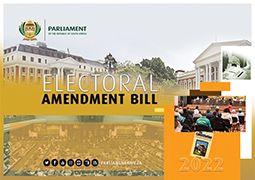
Parliament, Wednesday, 23 March 2022 – The Portfolio Committee on Home Affairs has today concluded an extensive and enriching nationwide public participation process on the Electoral Amendment Bill, paving the way for the next step in adhering to the directive given by the Constitutional Court.
“The committee made a commitment since the tabling of the Electoral Amendment Bill on 10 January 2022 that South Africans will be given an opportunity to decide the course that the country will take in amending the Electoral Act 73 of 1998. The committee invited the public to submit written submissions on the amendments, conducted virtual hearings and, lastly, conducted nationwide public hearings. The committee appreciates the Ministerial Advisory Committee, which has developed a foundation for this electoral discourse,” said Mr Mosa Chabane, the Chairperson of the committee.
The public hearings were preceded by two virtual hearings, in which stakeholders such as the Independent Candidate Association, the New Nation Movement, One South Africa Movement, the Council for the Advancement of South African Constitution, and the Inclusive Society Institute participated.
The committee then held 27 public meetings across the country, visiting areas such as Thohoyandou, Ladysmith, Upington, Senekal and Khayelitsha, where on average 20 speakers spoke per public meeting. These meetings were preceded by public engagements with stakeholders and the community through the Parliamentary Public Education Unit and the Parliamentary Democracy Office aimed at educating and conscientising the public about the impending hearings and the intentions of the Electoral Amendment Bill.
“The committee is satisfied that these engagements assisted the process and enabled South Africans to meaningfully engage with the Bill,” Mr Chabane said.
Various views were expressed on the Bill, with some supporting it and other rejecting it. The collegiality that characterised all the hearings is to be admired and is testament to the vibrancy and openness of South Africa’s democratic order. The committee is of the view that open, frank and vibrant public participation should be promoted and protected, as it is one of the pillars of this democracy.
The majority of those in support of the Bill highlighted that it ushered in a new order that will ensure accountability from public representatives. This, they hoped, will lead to better quality service delivery, which remains a major shortcoming. Despite the support, there were calls for the Bill to make explicit that independent candidates should pay election deposits and that the threshold for attainment of seats should be revised. The question of funding for independent candidates also featured high with many participants, with calls that the Political Funding Act must be amended to include independent candidates.
Those against the Bill underscored their belief that it is unconstitutional and does not allow for the true direct elections of independent candidates to Parliament. Those against the amendment Bill argued for a constituency-based system, with the name and face of the independent candidate being elected. Furthermore, others suggested that there is a need for the whole 400 seats of the National Assembly to be directly voted for from constituencies.
As public participation has now been concluded, the committee will meet to consider all the submissions made during both physical and virtual public hearings. The Department of Home Affairs will be invited to give its views on the submissions and then a report will be drafted, leading to the consideration of the updated version/s of the Bill.
ISSUED BY THE PARLIAMENTARY COMMUNICATION SERVICES ON BEHALF OF THE CHAIRPERSON OF THE PORTFOLIO COMMITTEE ON HOME AFFAIRS, MR MOSA CHABANE.
For media enquiries or interviews with the Chairperson, please contact the Committee’s Media Officer:
Name: Malatswa Molepo (Mr)
Parliamentary Communication Services
Tel: 021 403 8438
Cell: 081 512 7920
E-mail: mmolepo@parliament.gov.za

